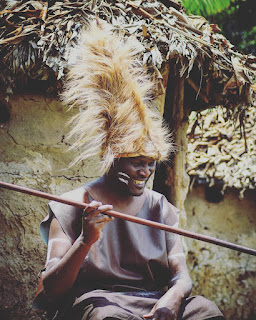THE SUBJUGATION OF THE MERU PEOPLE OF KENYA:
The tactic that was used to subdue and colonize the Ngââ people in Meru was unique. The Ngââ people are the tribe that inhabited and still lives in Meru(Meru isn't the name of a tribe but the Maasai name for the region that was forested around Mt Kenya).
The Ngââ(The Amîîrû) were warlike and jealously guarded their territory. They pushed back the Somalis and Borana and held back the Samburu and Maasai peoples. Any incursion to their lands, whether deliberate or accidental, was met with fierce resistance for centuries (under the democratic theocracy of the famed Njûrî Nçêêkê council of elders) the militarized Meru nation prospered in isolation. It successfully beat off the Islamic-Arab slave traders along with their Agikûyû and Akamba porters, thus no single fell prey to the Ma'afa(Indian Ocean slave trade).
The Europeans had subdued the Agikûyû, the Akamba, the Aembu and their next stop was the Amîîrû. The British faced stiff resistance from the Tharaka of southern Meru, whose light poisoned arrows and guerilla tactics had the whites beat a hasty retreat.
The Britons then did their homework and realized that the Amîîrû we "notoriously religious" as Mbiti put it. So they(the British) with the help of fellow colonizers-the Italians and French, sent an army of missionaries, priests and Nuns into the Meru nation. They (British) did a survey and divided up Meru assigning each Christian denomination a territory-The Methodists and The Roman Catholics were most active. The Amîîrû who revered God gladly accepted the missionaries and slowly the Amîîrû way of life, government, and language were destroyed.
The greatest casualty of this systematic pulverization of civilization was Amîîrû arts and music. Amîîrû music, dances and instruments were deemed evil and vulgar and unchristian the spirituality and religion of my ancestors was labelled "Pagan&Satanic", our initiation ceremonies-inhuman, thus the community via converts and Christianized/Europeanized Njûrî Nçêêkê waged a war against Amîîrû music. That is why until recently Meru music was unheard of, in fact, musicians were often looked down upon and bore a degradatory name-"Îthârîâ" i.e one who wrecks homes, a home breaker. After "independence", the governments of Jomo and Arap Moi continued with the suppression of Meru music-this had a ripple effect on Meru politics, the Agikûyûfication of Meru is in plain sight, it is only with the opening up of the airwaves that Meru music has had a rebirth along with the Amîîrû sense of pride.
I think universities based in Meru county should start language research centres to save the Ngââ lingo from death. We need to preserve the vernacular vocabulary, music, dance, artwork, customs and government.
Sadly, the only place I can get "good" KiMeru is in the KiMeru Bible, isn't that ironic!?,a religion that was used and is still used as an imperialist's weapon for dominion over my people is practically the last bastion of my language..smh!.
Few Amîîrû people know elders used rap to pass on history. The Meru rap was and is still known as "Rîîntá", I have heard the privilege of listening to it and I loved it.


Comments
Post a Comment